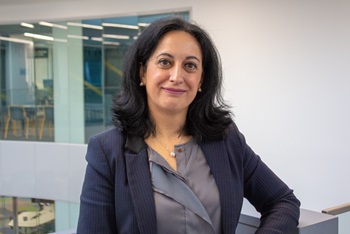The UK’s efforts to decarbonise industry have had a fresh boost with the government setting up the Industrial Decarbonisation Research and Innovation Centre (IDRIC).
The new centre is led by Professor Mercedes Maroto-Valer, who spoke to a packed SCI Energy Group webinar held in May, providing an overview of how IDRIC will play an essential role in helping the UK industrial sector prepare for a greener future.
IDRIC was established in January 2020, with the remit of being the hub for industry, policymakers, academia and other stakeholders to deliver proposals for the decarbonisation of the UK’s industrial hubs. The UK has a long history in developing and implementing industrial decarbonisation technology, but as Professor Maroto-Valer pointed out; IDRIC is about bringing the wealth of information together and creating a joined up and coherent strategy for the UK’s industrial clusters. The largest six industrial clusters contribute approximately one-third of the UK’s industrial carbon dioxide emissions.
‘The UK’s industrial clusters are home to energy intensive businesses which need to decarbonise so that they can compete in the low-carbon global economy. It is these clusters that will drive inward investment, protecting jobs and creating new ones,’ Professor Maroto-Valer commented.
IDRIC has seen a lot of activity since its launch. ‘We have clear goals,’ Professor Maroto-Valer said. ‘By the mid-2020s we want to see deployment of infrastructure at scale, with at least one low-carbon industrial cluster in place by 2030 and the world’s first net-zero carbon industrial cluster by 2040.’

‘Taking a very holistic approach, it’s about deploying research and innovation that is going to be very important. But it’s also around building capacity, supporting policy, developing leadership, and of course sharing knowledge which is going to be very critical. We want to help clusters, and indeed the whole of the UK, on the road to decarbonisation. In addition, we want to advocate for the benefits that industrial decarbonisation will bring within and across the UK’s industrial clusters,’ Professor Maroto-Valer said.
IDRIC is one strand of the UK’s Industrial Cluster Mission that is supported with £170 million in funding by the Industrial Strategy Challenge Fund (ISCF). IDRIC will focus on accelerating investment, reducing costs, timeframes and risk by bringing together established and emerging technology bases.
Having been launched in January 2020 IDRIC is working to a tight schedule. The early part of the year was spent identifying the challenges and exploring solutions, the organisation is now at the stage where it is defining the programmes needed so the UK can meet the 2040 goal. IDRIC has been able to engage a vibrant base of stakeholders including the local community, academia and funders all sharing knowledge.
‘We want to build a critical mass of individuals to ensure deployment of these important decarbonisation strategies,’ Professor Maroto-Valer said. ‘We believe that our approach is somewhat unique. We have started with a bottom up approach gathering as much information as we can from a diverse base.’ Outputs from the many stakeholder events are being shared on a range of platforms. Bringing together all that has been learned; IDRIC is now at the stage where it is co-creating a number of integrated multidisciplinary research and innovation programmes which will be submitted for the approval of UKRI.
The outputs are wide ranging looking at socioeconomic and policy themes through to investment and of course the range of low-carbon technologies. With 156 stakeholder organisations providing input at a number of events, IDRIC has a rich seam of knowledge to draw on. ‘We want to ensure that there are the right mechanisms available for all stakeholders to engage,’ Professor Maroto-Valer said.
As IDRIC moves into the second half of 2020, the focus will be on the delivery of impactful and timely activities and setting out the steps needed for the UK to reach its 2050 zero emissions target.
Keep up to date and find out more about IDRIC visit: www.idric.org
Related Links
- Register for our next Online Webinar - Future opportunities for CO2: the chemistry of carbon dioxide and its role in decarbonisation
- Energy Group
- Greenhouse Gases Science and Technology
